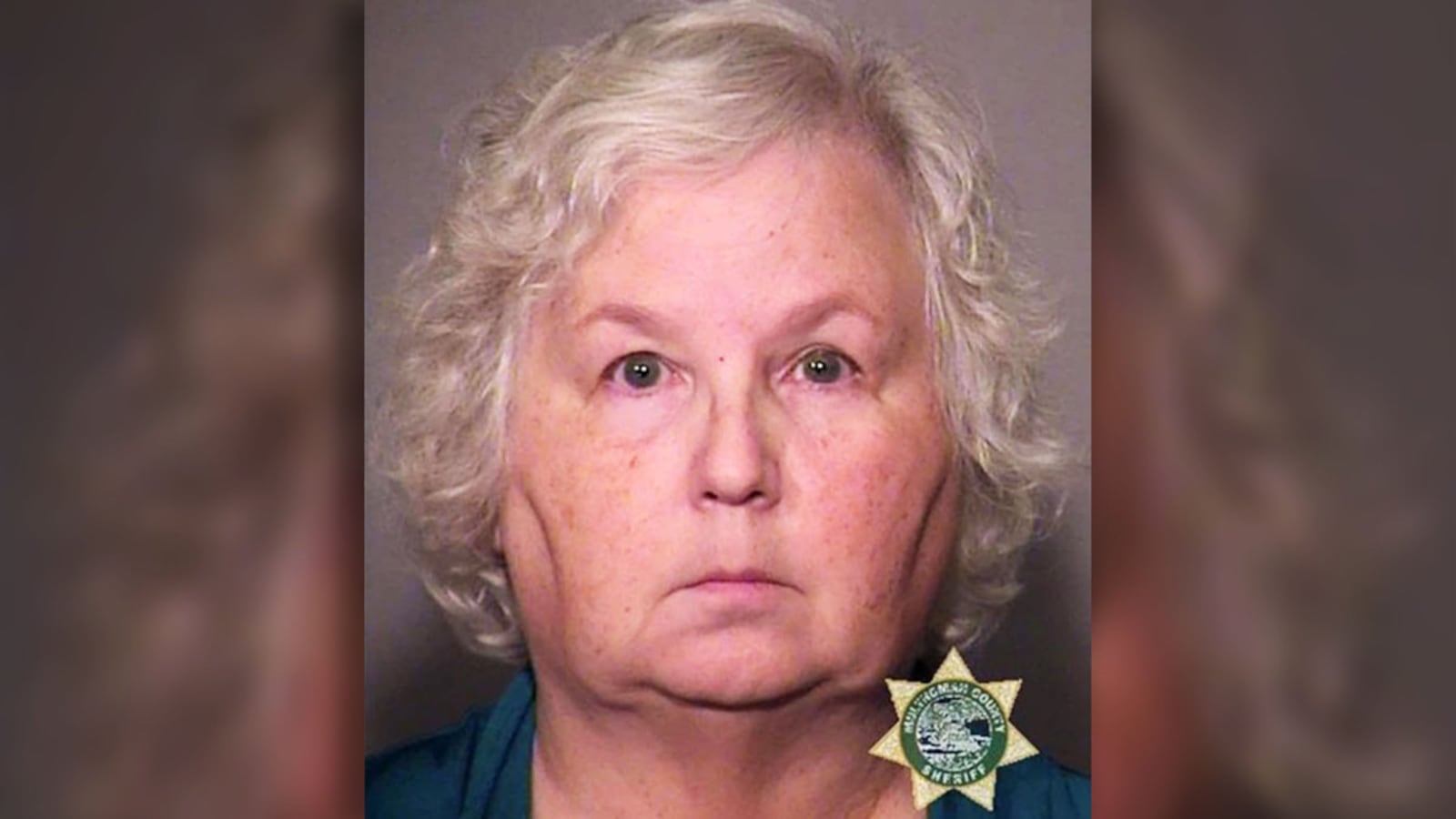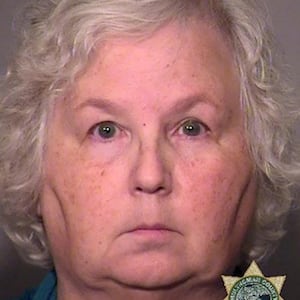Daniel Brophy’s family members have awaited justice for more than three years since he was gunned down while filling water and ice buckets in the kitchen of the now-defunct Oregon Culinary Institute in June 2018. Brophy’s wife, 71, a romance novelist who wrote an essay titled “How to Murder Your Husband” in 2011, has waited in jail.
The COVID-19 pandemic is largely to blame for the gap between Nancy Crampton-Brophy’s 2018 arrest on suspicion of murdering her husband of 27 years and her murder trial, which is scheduled to begin Monday. Prosecutors say Crampton-Brophy’s lawyers have used the pandemic in a number of attempts to wriggle out of the consequences of her alleged crime, from a motion to let her await trial in a guest house so she wouldn’t catch COVID-19 in jail to another asking a judge to delay the trial on the grounds that older jurors more likely to view the defendant in a favorable light would likely skip jury duty for fears of catching the disease.
Now, Crampton-Brophy will finally be forced to answer the charge that she killed her husband in pursuit of more than $1 million in life insurance. And Daniel Brophy’s family will finally get some resolution to their father’s murder.
“It’s been horrible. Every time they get ready to go it’s a delay, whether it’s COVID, defense motions—there’ve been two defense set-overs—they get themselves all geared up and into that mind frame and then it’s all for naught again,” attorney Christine Mascal told The Daily Beast on Wednesday. Mascal represents Daniel Brophy’s son, Nathaniel Stillwater, who has filed a wrongful death lawsuit against Crampton-Brophy, seeking $1.7 million in damages. “With all these delays, the family has had to put it out of their minds. They’re very anxious and excited to get this thing going.”

Daniel Brophy and his son Nathaniel Stillwater.
GoFundMeBrophy’s 2018 murder “was a shock” to Stillwater and his relatives, Mascal said. Brophy had just arrived at work that June 2 morning at the Institute, where his students and fellow teachers alike all admired him. Someone shot him in the back and then in the chest, piercing his heart and killing him. For several months, the murder was a mystery, with no signs of a struggle or a robbery, and no known enemies of Brophy—until investigators began digging into Brophy’s wife’s activity online.
The evidence detectives unearthed was circumstantial, but juicy. For motive, there were the half-dozen life insurance policies Crampton-Brophy stood to collect upon her husband’s untimely death, a figure boosted by several hundred thousand dollars if he died on the job. For a murder weapon, there was the slide and barrel pistol Crampton-Brophy allegedly purchased on eBay after visiting the website www.ghostguns.com, that would match the 9mm handgun she told police she and her husband jointly bought at a Portland gun show but never used. “Detectives then suspected that Nancy Brophy removed the original slide and barrel from the gun show gun that she relinquished to the police, replaced it with the eBay- purchased slide and barrel shot her husband, and then replaced the eBay slide and barrel with the original, thus being able to present a new, fully- intact firearm to police that would not be a match to the shell casings that she left at the crime scene,” prosecutors wrote in an April 2020 memorandum. “Detectives have never recovered the slide and barrel purchased on eBay. Nancy Brophy deleted her eBay account just days after the murder.”
There was also surveillance footage contradicting Crampton-Brophy’s claims to police that she stayed home after her husband of 27 years left for work that morning, footage near the crime scene that showed her driving her Toyota minivan in two directions: one at 6:39 a.m., toward the shooting, another away from it at 7:28 a.m., according to court filings.
Dan Brophy was killed in that window.
“Although that first shot likely paralyzed Dan Brophy and rendered him immobile, lying on his back, Nancy Brophy then walked over to the helpless victim and shot him again at close range, also piercing the heart and ensuring that Daniel Brophy would die,” prosecutors wrote in a 2020 court filing.
And the most salacious, albeit circumstantial details: Crampton-Brophy’s own writing, which for true crime buffs couldn’t possibly be more titillating.
“Writers are liars,” she wrote in a post on her website. “I don’t remember who said that but it’s not true. In writing fiction, you dig deep and unearth portions of your own life that you’ve long forgotten or had purposely buried deep.”
Crampton-Brophy described a mostly idyllic life and marriage, “in the beautiful, green and very wet, Northwest (sic), married to a Chef whose mantra is: life is a science project. As a result there are chickens and turkeys in my backyard, a fabulous vegetable garden which also grows tobacco for an insecticide and a hot meal on the table every night.”
She knew Daniel Brophy was Mr. Right when he responded to an invitation to a bath with “Yes, but I’m making hors d’oeuvres,” she wrote. “Can you imagine spending the rest of your life without a man like that?”
The couple spent the rest of his life together, but not hers. In the same post, Crampton-Brophy hinted that perhaps the marriage wasn’t as happy as it seemed, with “ups and downs, more good times than bad,” she wrote. “For those of you who have longed for this, let me caution you. The old adage is true. Be careful what you wish for, when the gods are truly angry, they grant us their wishes.”
The writer’s case made national headlines after The Oregonian unearthed an explosive piece of Crampton-Brophy’s work, back in 2011, titled “How to Murder Your Husband.” The work was supposedly tongue-in-cheek, but the author’s advice bore eerie similarities to her husband’s ultimate killing. “As a romantic suspense writer, I spend a lot of time thinking about murder and, consequently, about police procedure. After all, if the murder is supposed to set me free, I certainly don’t want to spend any time in jail. And let me say clearly for the record, I don’t like jumpsuits and orange isn’t my color.”
In the next section, “Motives,” Crampton-Brophy starts with the financial aspects. “This is big. Divorce is expensive, and do you really want to split your possessions? Or if you married for money, aren’t you entitled to all of it? The draw back (sic) is the police aren’t stupid. They are looking at you first. So you have to be organized, ruthless and very clever. Husbands have disappeared from cruise ships before. Why not yours?”
Crampton-Brophy advises against crimes of passion, because there’s “a trail that leads directly to you,” and “does not look like a stranger was involved. And who is left to clean the blood from your carpeting?” If the church frowns on divorce, “it helps to be a widow,” she advises, adding “it helps if you aren’t too burdened by the 10 commandments.”
As to how to get the job done, she starts with guns. “Loud, messy, require some skill. If it takes 10 shots for the sucker to die, either you have terrible aim or he’s on drugs.” Knives are out, because “blood everywhere. Eww.” A garrote is a no-go, she wrote, because “how much upper body strength does it require to strangle a person?” Poison, “a woman’s weapon,” takes too long. “Plus, they are sick the entire time. Who wants to hang out with a sick husband?” And a hired gun? “Do you know a hit man? Neither do I. And an amazing number of hit men rat you out to the police. Or blackmail you later.”

Nancy Crampton-Brophy appears in Multnomah County Circuit Court in Portland, Oregon in 2018.
Multnomah County Circuit Court/Courtesy of The Oregonian/APCrampton-Brophy also considers murder by “heavy piece of equipment” and “hiring a lover,” both problematic for different reasons. But in the end, she writes, “I find it easier to wish people dead than to actually kill them… but the thing I know about murder is that every one of us have it in him/her when pushed far enough.”
Seven years later, Crampton-Brophy’s husband was gone.
On Facebook, Crampton-Brophy shared “sad news” the day after the murder. “My husband and best friend, Chef Dan Brophy was killed yesterday morning… while I appreciate all your loving responses, I am overwhelmed.”
Detectives soon found the ghost gun purchase, and that Crampton-Brophy bookmarked a post entitled “10 Ways to Cover Up a Murder” in an iTunes account she shared with her husband. When arrested in September 2018, she asked police “You’re arresting me? You must think I murdered my husband.”
Next came a Multnomah County grand jury indictment, for one count of murder.
For Daniel Brophy’s family members, “there’s no question in their minds who caused his death,” Mascal told The Daily Beast. Yet while the evidence against Crampton-Brophy may be salacious, it’s also highly circumstantial, Mascal said. “That’s the challenge,” she said. “But I think there’s pretty compelling evidence to be presented by the state. It will establish that she’s responsible for the murder.”
Neither Crampton-Brophy’s attorneys nor prosecutors agreed to be interviewed for this story.







